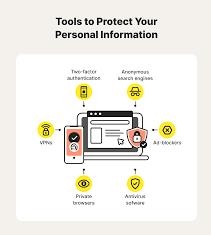In a world when every online action discreetly builds a thorough profile of us, protecting our privacy has become an essential digital shield. In 2025, a set of very useful tools will give you back control through strong encryption, new ways to stay anonymous, and strict tracking blocks. These tools will be even more powerful thanks to AI-enhanced defenses that make security a normal part of everyday life.
Encrypted communication platforms like **Proton Mail** are at the forefront of this endeavor. They offer end-to-end encryption so strong that even the service providers can’t read your emails. Their AI-powered spam filters also do an excellent job of keeping undesirable communications out. In addition, **Proton VPN** encrypts your internet connection and hides your IP address, making it very hard for intruders to spy on you online. These levels of encryption make it much less likely that someone will be able to intercept your data or spy on you while it is being sent.
Browsers like **Brave** take privacy to the next level with features like automatic ad and tracker blocking, enforced HTTPS connections, and integration with the Tor network, which makes users look almost invisible online. Its local AI features nicely summarize web pages without giving up user privacy to cloud-based services. In the same way, **Firefox** and **Mullvad** focus on anti-fingerprinting features that make it harder for trackers to follow your online movements by trying to uniquely identify your device.
To keep trackers from following you all the time, you need more than simply smart browsing. Two-factor authentication (2FA) is a very effective way to keep someone from getting into your account, even if they have your password. This is especially true when you use physical security keys like the YubiKey. At the same time, deleting search engine histories and cookies and always using VPNs breaks the data trails that hackers and organizations use to profile people and run phishing scams.
On a larger scale, tools like **Segment** and **DataGrail** that are focused on businesses are good examples of ethical data stewardship because they let companies manage user data in a way that is open and in line with changing privacy laws. This helps create a culture of respect for personal information in the digital economy.
To make the most of this changing privacy ecosystem, think about using this checklist:
1. Use encrypted email services like Proton Mail or Tutanota to keep your messages safe.
2. Use privacy-first browsers like Brave or Firefox to block trackers and advertisements that get in the way.
3. To hide your location and encrypt your traffic, use a trusted VPN like Proton VPN.
4. For important accounts, turn on multi-factor authentication using hardware tokens like YubiKey.
5. To leave less of a digital trail, delete your cookies and search history often.
6. Add privacy extensions that stop tracking scripts and fingerprinting methods.
7. Stay up to current on privacy policies and choose platforms that are open about what they do.
8. Use anonymous networks like Tor to browse the web privately or when you don’t want to be tracked.
Instead of thinking of online privacy as a hopeless battle, using these technologies turns you from a passive target into an active protector of your own data. These technologies create a very strong and reliable shield, just like locking your doors and closing your blinds in real life. This shield changes with new technologies and your careful attention, making privacy protection an easy, forward-looking journey in 2025 and beyond.






